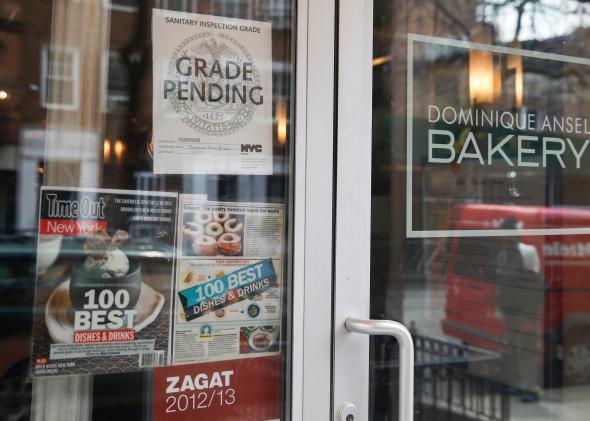New York City restaurants have a new reason to fear bad Yelp reviews: The health department is watching.
Health officials are drawing on Yelp’s reservoir of data to track down unreported foodborne illnesses and food-handling violations. Using nothing more than reviews on the site as a starting point, researchers at Yelp, Columbia University, and the New York City health department were able to identify three previously unreported outbreaks of foodborne illnesses and multiple food-handling violations, according to a paper published by the Centers for Disease Control and Prevention on Thursday.
Between July 2012 and March 2013, researchers scanned 294,000 Yelp restaurant reviews for the keywords “sick,” “vomit,” “diarrhea,” and “food poisoning.” Reviews were considered highly likely to describe a foodborne illness if they contained those terms, reported two or more people as ill, and allowed for an incubation of 10-plus hours (the timespan needed for most foodborne illnesses to manifest).
Experts found nearly 500 posts to be consistent with cases of recent foodborne illnesses—and only 3 percent of them had been previously reported to the health department. The offending food items were thought to be house salad, shrimp and lobster cannelloni, and macaroni and cheese spring rolls, according to the CDC report. Food-handling violations included bare-hand contact with prepared foods, mouse activity, and live roaches. Yum.
The Yelp-Columbia-Department of Health collaboration is the latest sign that researchers are waking up to the wealth of user-generated content and information on platforms like Yelp, Twitter, Facebook, and so on. Similar projects include Google’s Flu Trends map and the University of Michigan Economic Indicators From Social Media (which might be summed up as Twitternomics). Each takes a large volume of something—Yelp reviews, search terms, tweets, etc.—and sifts through the mountain of data to identify useful trends. But Yelp’s project is particularly intriguing because it has the potential to dramatically improve elements of public health.
You also have to wonder why so many potential food-poisoning complaints weren’t reported to the city but were posted on Yelp. Perhaps part of the problem is that lots of people don’t know how to go about submitting a formal complaint but have heard of Yelp. Even if you do know the city’s system exists, calling 311 or navigating the official complaint website is cumbersome. Venting on Yelp is simple, instantly gratifying, and free of bureaucratic procedures. For an already disgruntled consumer, that must sound a whole lot more appealing.
